
Cardiovascular Toxicology
Scope & Guideline
Advancing insights into toxic influences on cardiovascular health.
Introduction
Aims and Scopes
- Cardiotoxicity Mechanisms:
Research investigating the molecular and cellular mechanisms underlying cardiotoxicity, particularly those induced by chemotherapeutic agents, environmental toxins, and other pharmacological agents. - Therapeutic Interventions:
Studies focusing on potential protective strategies and therapeutic approaches to mitigate cardiotoxic effects, including the evaluation of natural compounds, pharmacological agents, and lifestyle interventions. - Environmental and Occupational Health:
Exploration of the impact of environmental pollutants and occupational exposures on cardiovascular health, including studies on heavy metals, particulate matter, and other toxic substances. - Genetic and Epigenetic Factors:
Research examining the role of genetic predispositions and epigenetic modifications in susceptibility to cardiotoxicity and cardiovascular diseases. - Innovative Diagnostic Tools:
Development and validation of novel diagnostic methods, including biomarkers and imaging techniques, for early detection and prediction of cardiotoxicity in various patient populations.
Trending and Emerging
- Nanoparticle Toxicology:
Research into the cardiotoxic effects of nanoparticles and their protective strategies is gaining momentum, driven by the increasing use of nanotechnology in medicine and environmental applications. - Role of Circular RNAs and Non-coding RNAs:
Emerging studies are focusing on the role of circular RNAs and other non-coding RNAs in modulating cardiotoxic responses, indicating a growing interest in the regulatory mechanisms of gene expression in cardiovascular health. - Impact of Lifestyle Factors:
There is an increasing focus on how lifestyle interventions, such as diet, exercise, and fasting, can mitigate cardiotoxicity, reflecting a holistic approach to cardiovascular health. - Integrative Approaches to Cardiotoxicity:
The integration of multi-omics technologies (genomics, proteomics, metabolomics) to study cardiotoxicity is trending, allowing for a comprehensive understanding of interactions at various biological levels. - Machine Learning in Predicting Cardiotoxicity:
The application of machine learning algorithms to predict cardiotoxic outcomes is an emerging theme, showing the journal's commitment to incorporating advanced computational methods in cardiovascular research.
Declining or Waning
- Traditional Cardiovascular Pharmacology:
Research on classic cardiovascular drugs and their toxicological profiles has decreased, possibly due to a shift towards more contemporary therapeutic agents and innovative drug classes. - Animal Models of Cardiotoxicity:
While still relevant, studies exclusively using traditional animal models for cardiotoxicity assessment appear to be declining, as researchers increasingly adopt advanced in vitro techniques and humanized models. - Generalized Toxicology Studies:
Broad toxicological assessments that do not specifically address cardiovascular implications are less frequently published, indicating a more focused approach on cardiovascular-specific toxicological research. - Epidemiological Studies Without Mechanistic Insight:
Epidemiological research that lacks a mechanistic understanding of cardiovascular toxicity is becoming less common, as the field emphasizes studies that elucidate underlying biological processes.
Similar Journals

CELL BIOLOGY AND TOXICOLOGY
Bridging the Gap Between Cells and Toxic AgentsCELL BIOLOGY AND TOXICOLOGY, published by SPRINGER, stands as a vital journal within the realms of cell biology and toxicology, boasting an impressive 2023 Q1 ranking in its fields, alongside robust Scopus rankings placing it in the top 11th percentile for Toxicology and the 22nd for Health, Toxicology and Mutagenesis. With an ISSN of 0742-2091 and an E-ISSN of 1573-6822, the journal has been a cornerstone of scientific discourse since its inception in 1984, and will continue to converge innovative research until 2024. The journal focuses on the interplay between cellular mechanisms and toxicological implications, making it an essential resource for researchers, healthcare professionals, and students keen on advancing their understanding of these critical areas. Although it does not offer open access, its high impact and prestigious standing ensure that its publications reach a wide audience dedicated to significant advancements in the life sciences.

ARCHIVES OF TOXICOLOGY
Uncovering Insights, Shaping SafetyARCHIVES OF TOXICOLOGY is a prestigious journal published by Springer Heidelberg, dedicated to advancing research in the field of toxicology and related disciplines. With a distinguished history dating back to 1930, this journal has continuously provided vital insights and groundbreaking studies, making it a cornerstone in the areas of health, toxicology, and medicine. Recognized for its high impact, it occupies a top-ranking position in Scopus, with remarkable quartile placements in 2023, categorizing it as Q1 in Health, Toxicology and Mutagenesis, and Q1 in Medicine (Miscellaneous). The journal highlights critical research and innovative methodologies, appealing to a diverse audience of researchers, professionals, and students committed to understanding the complexities of toxic substances and their implications for public health and environmental safety. The journal does not currently offer open access, allowing for a more traditional but rigorous peer-review process that ensures the quality and integrity of every published article. Join the global discourse in toxicological science with ARCHIVES OF TOXICOLOGY, where every contribution furthers the understanding of safety and toxicity in our world.
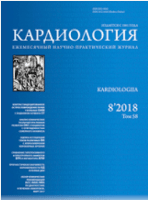
KARDIOLOGIYA
Empowering the Future of Heart Disease ManagementKARDIOLOGIYA is a renowned academic journal in the field of cardiology, published by the Russian Heart Failure Society. Since its inception in 1961, this journal has been dedicated to disseminating cutting-edge research in cardiovascular medicine, contributing to the global understanding of heart-related diseases and their management. With a significant publication history that spans over six decades, KARDIOLOGIYA provides a platform for both established researchers and emerging scholars to publish their findings. Despite its current Q4 category ranking in the 2023 Cardiology and Cardiovascular Medicine category, the journal plays a crucial role in promoting regional insights and advancements in cardiology, while striving towards higher visibility and impact within the academic community. While not an open-access journal, the journal is accessible to institutions and professionals in the Russian Federation and beyond, fostering collaboration and knowledge sharing among healthcare professionals. With a Scopus rank of #259 among 387 journals, it is well-positioned to enhance discourse in the field and support the development of innovative approaches to cardiovascular care.
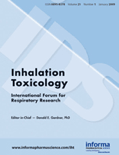
INHALATION TOXICOLOGY
Innovating Understanding of Toxic Responses to Inhalants.Inhalation Toxicology, published by Taylor & Francis Ltd, is a premier journal dedicated to advancing the field of toxicology with a particular focus on inhalation exposure and its impact on human health. Established in 1989, this journal provides a vital platform for original research, reviews, and case studies that explore the toxicological effects of inhaled substances, making it essential reading for researchers, health professionals, and regulatory scientists. With an Impact Factor that situates it in the Q3 category in both Health, Toxicology and Mutagenesis, the journal asserts its relevance within the scientific community, particularly emphasizing its contributions as indexed by Scopus rankings in related fields. Although it follows a traditional access model, the journal's commitment to delivering high-quality research continues to foster significant discussions and advancements in understanding inhalation toxicology. For those at the forefront of environmental science and pharmacology, Inhalation Toxicology is an indispensable resource for both current research and future innovations in the discipline.
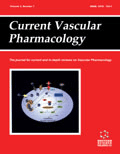
Current Vascular Pharmacology
Innovating Drug Development for Cardiovascular CareCurrent Vascular Pharmacology is a premier academic journal published by Bentham Science Publications Ltd, focusing on the intersection of pharmacology and cardiovascular medicine. With an impact factor that reflects its significance in the field, this journal ranks in the Q1 category for both Pharmacology and Cardiology, showcasing its dedication to high-quality research. Its Scopus ranks place it in the top percentile of its categories, highlighting its influence among scholars and practitioners alike. Issued since 2003 and continuing through 2024, Current Vascular Pharmacology aims to disseminate cutting-edge findings and foster knowledge exchange among researchers, professionals, and students engaged in cardiovascular pharmacology. Despite being a subscription-based journal, it remains a vital resource for those seeking the latest advancements in drug development and therapeutic interventions for vascular diseases. Located in the United Arab Emirates, the journal serves as an essential platform for global discourse on vascular health.
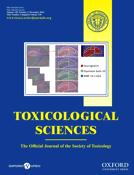
TOXICOLOGICAL SCIENCES
Unraveling Toxicity to Safeguard Our FutureTOXICOLOGICAL SCIENCES, published by Oxford University Press, is a premier journal in the field of toxicology that has been a cornerstone of scientific discourse since its inception in 1981. With an impressive 2023 impact factor and ranked in the Q1 category for Toxicology, this journal is highly regarded among researchers, professionals, and students dedicated to pharmacology and toxicology. The journal is committed to advancing the understanding of toxicological science, covering a breadth of topics that include the mechanisms of toxicity, risk assessment, and the regulatory aspects affecting public health. With an ISSN of 1096-6080 and an E-ISSN of 1096-0929, TOXICOLOGICAL SCIENCES facilitates open access scholarly work, ensuring that critical research reaches a global audience and promotes collaborative learning. As it converges towards 2024, the journal remains pivotal in shaping the future of toxicology research, providing insights that are essential for developing safer chemicals and protecting environmental health.
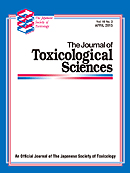
JOURNAL OF TOXICOLOGICAL SCIENCES
Shaping the Future of Toxicological ResearchThe Journal of Toxicological Sciences, published by the Japanese Society of Toxicological Sciences, is a prominent academic journal dedicated to the comprehensive study of toxicology and its related fields. Since its inception in 1976, the journal has provided a vital platform for researchers and professionals to disseminate innovative findings and insights in toxicology, with a focus on both experimental and clinical studies. Positioned in the Q3 quartile across various relevant categories, including Medicine (miscellaneous) and Toxicology as of 2023, the journal plays an essential role in advancing our understanding of toxic substances and their effects on biological systems. Although currently not open access, the journal maintains high academic standards and is indexed in Scopus, ranking #96 in Toxicology. Offering unique perspectives from Japan, it encourages global collaboration and discourse among toxicologists, making it an invaluable resource for students, researchers, and industry professionals alike.
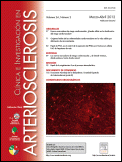
Clinica e Investigacion en Arteriosclerosis
Driving excellence in the understanding of cardiovascular diseases.Clinica e Investigacion en Arteriosclerosis is a premier academic journal dedicated to the field of cardiology and cardiovascular medicine, published by ELSEVIER. With its ISSN 0214-9168 and E-ISSN 1578-1879, the journal aims to disseminate high-quality research and innovations in the understanding and treatment of arterial diseases, contributing significantly to both clinical practices and pharmacological advancements. Established in 2007 and continuing into 2024, the journal has garnered recognition with a notable Q3 categorization in both Cardiology and Cardiovascular Medicine and Pharmacology (medical) for 2023, reflecting its impact in the academic community. Researchers and healthcare professionals utilizing this journal will find a diverse range of articles exploring novel therapeutic strategies and epidemiological data, making it an essential resource for advancing knowledge and practice in cardiovascular health. While it does not operate as an open-access journal, the findings published in Clinica e Investigacion en Arteriosclerosis are pivotal for understanding current trends and future directions in cardiovascular research.
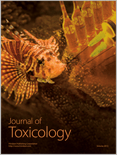
Journal of Toxicology
Empowering global research in toxicological science.Journal of Toxicology, published by HINDAWI LTD, stands as a pivotal open-access journal in the fields of toxicology and pharmacology since its inception in 2009. With an ISSN of 1687-8191 and an E-ISSN of 1687-8205, this journal is dedicated to disseminating high-quality research that critically examines the effects of toxic substances on living organisms. Located in Egypt and operating from their London office, it aims to provide an extensive platform for researchers worldwide to share findings that can inform better practices in safety and regulation. As of 2023, it has achieved significant recognition, holding a Q3 ranking in both the pharmacology and toxicology categories, and is indexed in Scopus with noteworthy percentile rankings (Toxicology: 57th and Pharmacology: 55th). With a focus on innovative studies and emerging areas such as environmental toxicology, biomarker research, and therapeutic interventions, the Journal of Toxicology invites both experienced researchers and students to contribute, thereby enhancing the breadth and depth of toxicological knowledge for the global scientific community.
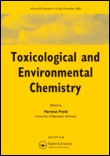
TOXICOLOGICAL AND ENVIRONMENTAL CHEMISTRY
Innovating solutions for a sustainable and healthy future.TOXICOLOGICAL AND ENVIRONMENTAL CHEMISTRY is a pivotal journal published by Taylor & Francis Ltd, addressing critical intersections between environmental chemistry and toxicology since its inception in 1979. With its ISSN 0277-2248 and E-ISSN 1029-0486, the journal serves as a platform for rigorous research and innovative methodologies in pollution control, health implications of environmental chemicals, and the broader spectrum of toxicological studies. Although it currently does not offer open access, the journal's impact in the field is underscored by its Category Quartiles rankings in 2023, placing it in Q3 across Environmental Chemistry, Health, Toxicology and Mutagenesis, and Pollution categories. Furthermore, its Scopus rankings reveal its significant role within the scientific community, specifically in areas such as Environmental Science and Toxicology. The journal aspires to foster multidisciplinary dialogue and advance knowledge that contributes to environmental sustainability and public health, making it an essential resource for researchers, professionals, and students dedicated to these fields.